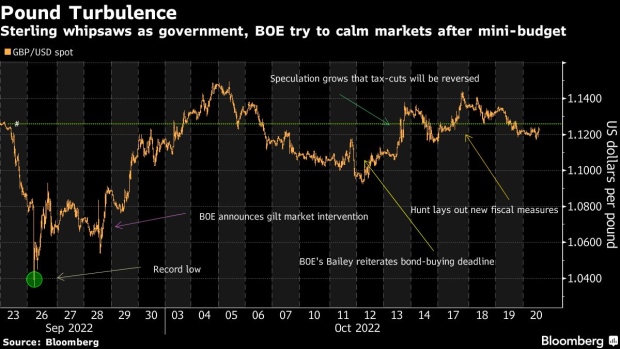Oct 20, 2022
Pound, Gilts Pare Gains After UK’s Truss Confirms Resignation
, Bloomberg News

(Bloomberg) -- Traders in UK government bonds helped topple Liz Truss. Now they’re setting their sights on the next goal: ensuring her successor will stick to the fiscal discipline required to shore up the country’s fragile finances.
Should word get out that the Conservative party is considering a new prime minister who embraces fiscal largesse or any other unorthodox position, the market reaction, they warn, will be as swift and severe as the wild four-week-long rout that followed Truss’s ill-fated proposal to slash taxes and boost spending. As Gordon Shannon, a portfolio manager at TwentyFour Asset Management, put it: “Don’t mess with bond vigilantes.”
Some of this, of course, is just trading floor bravado.
Traders and investors are feeling powerful after watching Truss step down after only 44 days in office. But some of that power is real. They now have the ability to help influence policy and politics in the most meaningful way for years. The BOE is slowly stepping back out of the market as part of its push to tame inflation, ceding more ground to investors to bid yields higher or lower in response to policy choices.
“The markets are clearly in charge now,” said Scott Service, portfolio manager and co-head of global fixed income at Loomis Sayles. “While some semblance of stability has returned following the about-face on fiscal policy, coming to agreement on the best course of action going forward to tame inflation without crushing the economy is no easy task.”
Read more: Truss Resigns as UK Premier After Tax-Cut Plan Backfires
Truss’ premiership saw gilt yields post some of their biggest moves on record and the pound sink to an all-time low after announcing the largest package of unfunded tax cuts in half a century. On Thursday, sterling rallied more than 1% after she confirmed her resignation.
The currency retreated later in the day, and slid as much as 1% on Friday to head toward $1.11. Gilts also dropped, with 10-year bond yields rising above 4%.
For now, the markets’ favorite appears to be Rishi Sunak, who warned that the outgoing administration’s fiscal measures would push Britain’s economy to the brink of collapse.
“If we get someone like Sunak in charge, given his finance background, his banking background, he would be viewed as positive and you’d probably see gilts and sterling rally at least in the very short term,” said Brad Bechtel, FX strategist at Jefferies.
Fiscal Plan
A new leader will be in place ahead of the slated announcement of the government’s medium-term fiscal plan that was due on Oct. 31, said Graham Brady, a senior Conservative lawmaker.
“Clearly a vote winner right now is ‘I’m going to be a really steady hand on the rudder’ and try and rebuild a bit of credibility,” said Lyn Graham-Taylor, a rates strategist at Rabobank.
The government appears to have learned its lesson, and has abandoned pledges for vast unfunded tax cuts. Veering away from the path set out by current Chancellor of the Exchequer Jeremy Hunt could easily plunge markets back into turmoil.
Meanwhile, traders have been reducing their bets on more aggressive BOE tightening since the government began rolling back its more expansive stimulus. That trend could continue if the government opts for an even more restrictive fiscal policy.
“If the UK decides to go for austerity, that would be very hard for the Bank of England to prescribe very high rate hikes in the coming months, with the risk of damping growth,” said Morgane Delledonne, head of investment strategy for Europe at Global X ETFs, in an interview on Bloomberg Television.
The BOE next meets to set rates on Nov. 3 and the market is currently pricing a high probability of at least a 75 basis-point increase.
“Short-term political uncertainty aside, it’s positive for both the pound and gilts in the long run because this episode will remind every candidate in the future to not undermine the credibility of the government by making outlandish spending plans,” said Rishi Mishra, an analyst at Futures First.
Still, there’s no denying that whoever takes office has their work cut out for them. Inflation in the UK is running in the double digits, the economy is sliding toward recession and the prospect of a debt deluge looms large.
“No new leader will want to fall foul of the markets in the same way as the outgoing prime minister,” said ING strategists including Antoine Bouvet.
--With assistance from Naomi Tajitsu, James Hirai, Libby Cherry, Greg Ritchie, Ruth Carson and Anna Edwards.
(Updates pricing, adds quote in 14th paragraph.)
©2022 Bloomberg L.P.






